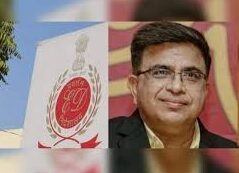New Delhi: The Enforcement Directorate (ED) on Sunday arrested retired IAS officer Anil Tuteja under Section 19 of the Prevention of Money Laundering Act (PMLA) in connection with the alleged liquor scam in Chhattisgarh.
The federal agency has claimed that Tuteja, a 2003 batch IAS officer, is the “chief architect” of the scam. The agency had registered a fresh FIR in connection with the liquor scam on April 9, based on the existing FIR lodged by the Chhattisgarh Economic Offenses Wing (EOW).
The new FIR was filed after the Supreme Court recently quashed the ED’s previous FIR, which was based on the Income Tax Department’s complaint.
The agency claimed Tuteja was called on Saturday to record his statement but he remained “elusive and uncooperative” during interrogation.
People in the know said the ED investigation revealed that Tuteja had received proceeds of crime worth Rs 14.41 crore and was the “mastermind” of the liquor scam. “Although officially he was not a part of the excise department of Chhattisgarh, he was constantly involved in decisions related to the excise department.
“He was also found discussing excise matters with other co-accused in the case,” said a senior officer on condition of anonymity. Tuteja was arrested around 3:54 am.
Private liquor shops are not allowed to operate in Chhattisgarh. All liquor shops are operated by M/s CSMCL {Chhattisgarh State Marketing Corporation Limited), a state government run entity, which is the sole entity with the responsibility of demand and purchase of liquor from distillers and IMFL suppliers.
The procured liquor is sold through about 800 government shops across Chhattisgarh. These shops are run by out-sourced manpower suppliers and the cash generated from the sale of liquor at these shops is collected through outsourced cash collection agencies.
Elaborating on the modus operandi of the case, the people quoted above said that “collaborating officers” were deployed in key positions and had “political support to avoid any backlash”.
The ED investigation revealed that “as a result, a corrupt syndicate was formed which deliberately engineered policy changes and used this department to extract maximum bribes and commission at the expense of the state exchequer and the general public”.
The investigation found that “the level of corruption was such that in order to prevent theft of loot by syndicate insiders and to properly account for it, the accused persons maintained detailed logs/excel sheets of the proceeds of corruption.
He himself gave different names to the commissions depending on the source from which they originated.’

